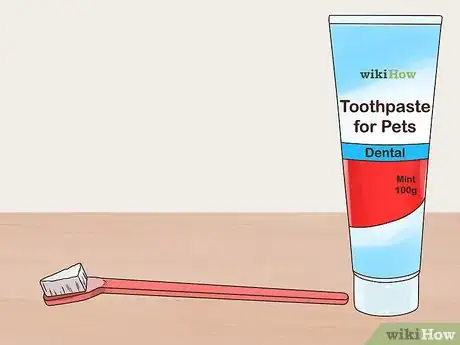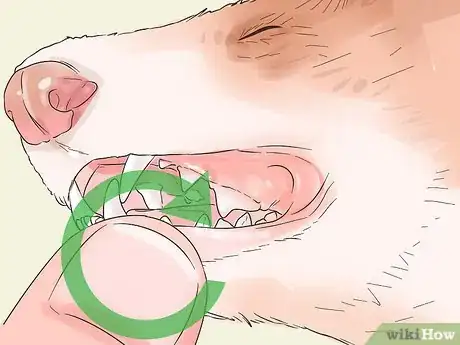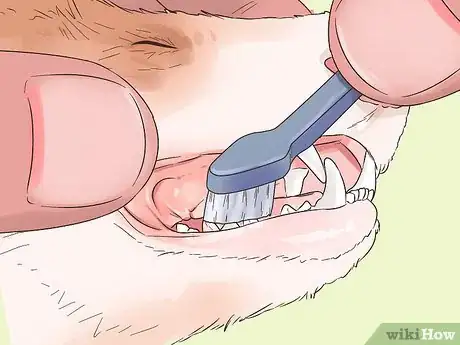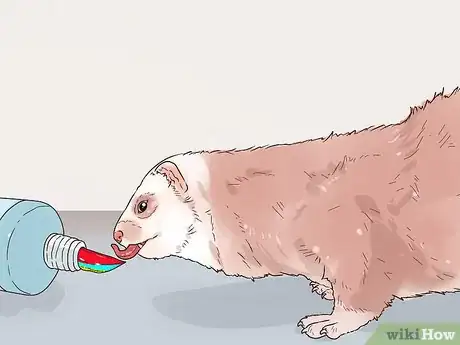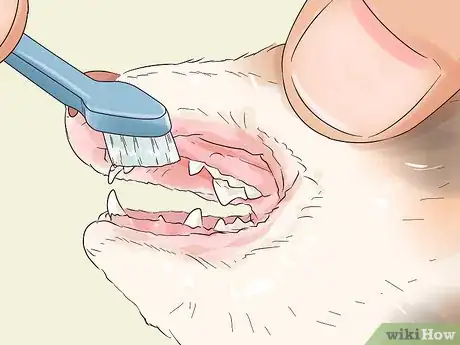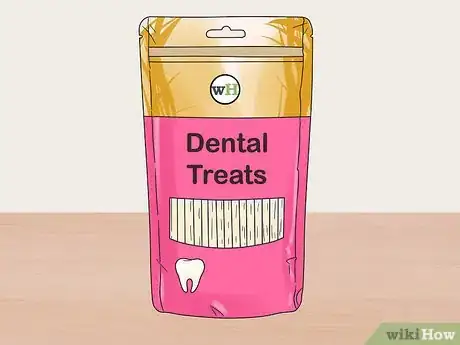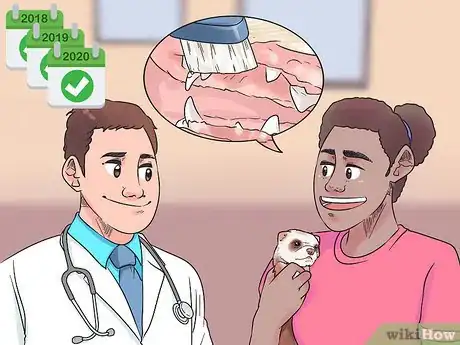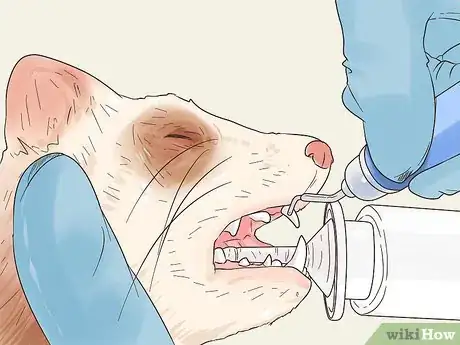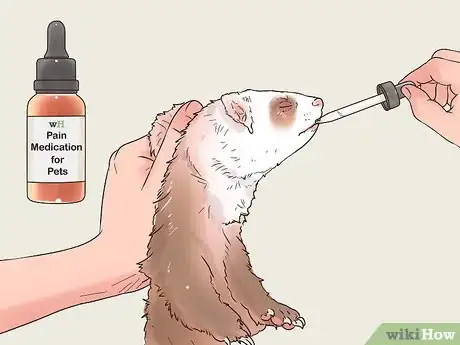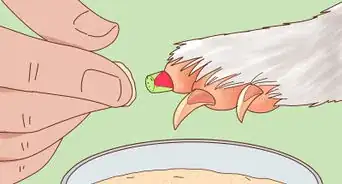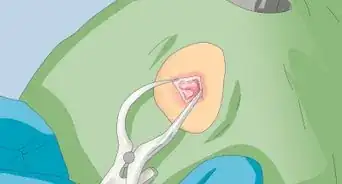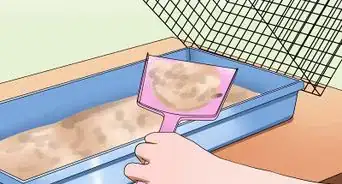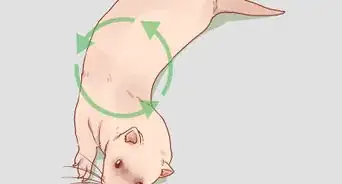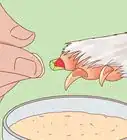This article was co-authored by Pippa Elliott, MRCVS. Dr. Elliott, BVMS, MRCVS is a veterinarian with over 30 years of experience in veterinary surgery and companion animal practice. She graduated from the University of Glasgow in 1987 with a degree in veterinary medicine and surgery. She has worked at the same animal clinic in her hometown for over 20 years.
This article has been viewed 16,927 times.
Dental care is an important part of keeping a ferret healthy. Daily brushing is recommended, but it might take a week or two to ease your ferret into it. Start by massaging its cheeks and mouth, then gradually introduce a toothbrush and toothpaste. Keep sessions short at first, then work up to brushing thoroughly for two minutes. If you can't manage daily brushing, doing it as often as possible is better than nothing. In addition to brushing, vets recommend annual dental exams and cleanings, especially for older ferrets.
Steps
Getting Your Ferret Used to Brushing
-
1Get a small toothbrush and pet toothpaste. Your local pet supply store will carry toothbrushes designed for kittens and puppies that are small enough for a ferret. It'll also have pet toothpaste, which is safe for a pet to swallow. Never use human toothpaste to brush a pet's teeth.
- Human toothpaste contains too much fluoride to be safe for ferrets. This makes it extremely toxic for ferrets. Always use a pet-safe toothpaste.
-
2Massage your ferret's cheeks and mouth. Ease your ferret into brushing by gently rubbing its cheeks and around its mouth. Massage for about 30 seconds at a time several times a day for a few days. Offer a treat and verbal praise to encourage it to enjoy having its mouth touched.[1]
- If you get your ferret used to having its mouth touched gradually, you'll have an easier time brushing its teeth.
Advertisement -
3Rub its teeth and gums when it's used to having its mouth touched. After your ferret becomes comfortable with having its face touch, try lifting its lips and rubbing the inside of its mouth. Use your finger to simulate brushing motions for 30 seconds a few times a day.[2] Be sure to reward your ferret with treats and praise.
- If your ferret tends to bite a lot, you might have to skip finger rubbing and just introduce the toothbrush.
-
4Introduce the toothbrush without toothpaste. After a few days of rubbing its teeth and gums with your finger, try placing the toothbrush in its mouth. Don't add toothpaste yet - just wet the brush. Again, limit sessions to 30 seconds a few times a day.
-
5Let it taste the toothpaste. Once you've gotten your ferret used to the brush, dab your finger with a small amount of toothpaste. Let your ferret lick it off your finger, and praise it so it learns that toothpaste is a good thing.[3]
- You can find a variety of pet toothpaste flavors. Peanut flavor tends to be popular among ferrets. If your ferret doesn't like the first flavor you choose, try switching to another kind.
Brushing Your Ferret's Teeth
-
1Brush gently and start with short sessions. Lift your ferret's lips and try to lightly brush each tooth with circular motions. Pay special attention to the outsides of the teeth, which is where the most plaque builds. Limit your first brushing sessions to around 30 seconds.
- Do your best to get all the way to the back teeth. If your ferret gets upset, give it a break and try again later.
-
2Increase brushing time gradually to two minutes. If possible, brush your ferret's teeth once a day. Add a little more time each day so you can clean your ferret's teeth more thoroughly. Over the course of the first few days, try to get to the point where you can brush for two minutes.
-
3Check for dental problems when you brush. As you brush, look for dark-colored areas of tartar buildup and red, swollen gums. Check for deep, yellowish stains, which are a sign of physical damage. In addition, check for other signs of obvious damage, such as chipped or broken teeth.
- A vet will need to handle tartar buildup and other dental issues. Brushing can remove plaque, but tartar can only be removed by professional scaling.
-
4Give your ferret toothbrushing treats. In addition to manual brushing, you can offer your ferret treats that will help keep its teeth clean. They'll most likely be labelled for dogs or cats, but it's fine to give them to your ferret. You can find dental treats at your local pet supply store.
- Toothbrushing treats aren't a substitute for regular manual brushing.
Providing Veterinary Dental Care
-
1Have a vet examine your ferret's teeth annually. Like dogs and cats, it's recommended that ferrets see a vet for a dental exam at least once a year. Vets are now trained in animal dentistry, so they'll be able to handle any problems they find.[4]
- You should bring your ferret to an experienced exotic small animal vet. To find a suitable vet, as your ferret-owning friends, search online, or contact your local ferret owners group.
-
2Get your ferret's teeth professional cleaned regularly. Since dental issues can cause pain, difficulty eating, and other health issues, vets recommend annual cleanings for ferrets. A deep cleaning involves anesthesia, as the vet will need access to the entire mouth. They'll use special tools to remove tartar deposits and, if necessary, to repair broken teeth.
- Annual dental cleanings are especially important for ferrets over three years old.
-
3Give your ferret pain medication and soft foods after a deep cleaning. After a deep cleaning, the vet will provide you with anti-inflammatory and pain medication. Administer these according to the vet's instructions, and offer soft foods instead of kibble for five to seven days.
- You'll either give your ferret liquid medication with a dropper or a soft, chewable tablet.
-
4Look for low-cost dental care options. Standard dental cleanings typically cost between $100 and $200 (US). While proper dental care can help a ferret live a long, healthy life, cost often prevents owners from providing it. Keep tabs on your local vets and animal shelters, which might occasionally offer low-cost cleanings.
- For example, in the United States, February is National Pet Dental Health Month, and vets and shelters sometimes offer free or discounted cleanings to celebrate.[5]
- You could also talk to your vet about setting up a payment plan for a dental cleaning.
- Pet insurance rarely covers ferrets and other exotic pets. Plans that are available for ferrets don't typically cover dental cleanings.[6]
References
- ↑ https://www.ferret.com/ferret-articles/ferret-dental-care/9769/
- ↑ https://www.ferret.com/ferret-articles/ferret-dental-care/9769/
- ↑ https://www.ferret.com/ferret-articles/ferret-dental-care/9769/
- ↑ http://www.peteducation.com/article.cfm?c=11+2062&aid=574
- ↑ https://www.avma.org/events/pethealth/pages/february-is-national-pet-dental-health-month.aspx
- ↑ http://www.pet-insurance-university.com/compare_vpi_pet_insurance_bird_exotic.html
About This Article
To keep your ferret's teeth clean, you should brush them once a day using a small toothbrush and toothpaste designed for pets. It might take your ferret a week or two to get used to having its teeth brushed, and it's usually best if you ease it into the process. Start by massaging its cheeks and mouth several times a day for a few days so it gets used to having its mouth touched. Then, you can start rubbing its teeth with your finger. Once it's comfortable with that, try brushing its teeth without any toothpaste for a few days. When you're ferret is used to the toothbrush, let it taste some of the toothpaste on its own, and then try brushing its teeth with it. Keep each brushing session to 30 seconds at first, and gradually work your way up to 2 minutes. For advice from our Veterinary co-author, like how to have your ferret's teeth professionally cleaned, read on!
